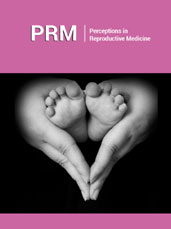- Submissions

Full Text
Perceptions in Reproductive Medicine
Lifestyle & Fertility
Harpreet Kaur*
Milann Fertility Center, India
*Corresponding author: Harpreet Kaur, Gynae & Reproductive Medicine, Milann Fertility Center, Chandigarh, India
Submission: December 12, 2017; Published: January 31, 2018

ISSN: 2640-9666Volume1 Issue4
Commentary
Overall approximately 10-15 % of couples face problem of infertility. Lifestyle factors play a key role in determining reproductive health and can positively or negatively affect fertility. These factors are modifiable habits & behaviours that can greatly influence overall health and well being, including fertility.
Lifestyle may affect the fertility by influencing:
a) Age
b) Obesity
c) Smoking, Alcohol & Illicit drugs.
d) Caffeine consumption
e) Environmental pollution, Use of mobiles
f) Nutrition
g) Hectic &erratic working style.
h) Stress.
Age related decline in fertility
With ageing there is marked decline in fertility in women and to lesser extent in men as well. As a women's number of oocytes decrease, menstrual cycles shorten, fertilility declines, menstrual irregularity begins. Due to education and employment, there is increasing trend for delayed chilbearing. This has got significant impact on fertility as women's fertility declines sharply after age of 35 years. Additionally there is increase in risk of aneuploidy with increasing age [1].
Obesity
Obesity is a global problem. Due to sedentary lifestyle and eating habits, there is increase in obesity. Overweight affects fertility by negatively influencing female hormones, ovulation son leading to decreased chances of conception. Further during treatment there is increased demand for gonadotropins & chances of success of ART also decreases.
Further during pregnancy, there is increased risk of miscarriage, DM & hypertension & macrosomia during pregnancy. So to get the optimal pregnancy outcome it's important to have ideal body weight in the pre-conception period. In men, obesity leads to altered semen parameters & sexual dysfunction.
To maintain the ideal body weight it is important to have healthy balanced diet & moderate exercise daily.
Underweight is equally bad for fertility. It affects the hypothalamic release of GnRH so affecting ovulation and negatively influences the pregnancy outcome as well [2].
Smoking & Alcohol negatively influence the fertility. There is no safe limit for smoking in pregnancy & hence it is advisable to stop smoking when planning to conceive. Smoking leads to follicular depletion- causes early menopause. (1-4 yrs earlier). Infertility rates in smokers are about twice as compared to non-smokers (both men & women). Even with IVF there is increased demand for Gonadotropin inj and ~30 % lower pregnancy rates in smokers. During pregnancy smoking leads to increased risk of miscarriage, birth defects & IUGR. In Men smoking leads to decrease in Count, Motility & Morphology of sperms.
For alcohol again there is no safe limit of alcohol consumption in pregnancy. Fetal alcohol syndrome is a well known entity due to ill effects of excessive alcohol consumption during pregnancy. Higher levels i.e. more than 1-2 units/week are best avoided when attempting pregnancy. Illicit drugs like heroine, morphine negatively affects the semen parameters & sexual relations.
Environmental pollution in the form of heavy metals, plastics, herbicides, pesticides and heat are known factors which negatively affect the fertility. Semen parameters are influenced by exposure to these environmental pollutants as the increase the level of reactive oxygen species (ROS). So, it's good to reduce exposure to these ROS and have a healthy balanced Diet rich in anti-oxidants. Daily serving of fruits & vegetable and avoiding junk foods can negate the negative effect of ROS. Use of mobile phones esp. Wearing mobile in the belt area & keeping laptop in lap has been demonstrated in various studies to negatively affect the semen parameters [3].
Stress
Infertility itself is a stressful condition & stress further adds on to infertility. Having stress decreases one’s chances of conceiving either naturally or with treatment; it leads to strained personal relations, sexual dysfunction which further aggravates the problem of infertility. So, it's very important to handle stress by means of various relaxation techniques, Yoga, meditation etc. Counseling plays a vital role in fertility.
All Fertility clinics should have good counseling survives to provide support to the couple throughout treatment. We as Physicians have prime responsibility to create awareness about these modifiable lifestyle factors & their effect on fertility. We need to motivate couples in the pre-conceptional period importance of healthy lifestyle, optimization of any pre-existing health problems so as to have a healthy pregnancy and healthy families.
References
- (2008) Optimising natural Fertility. Fertil & Steril 90(Suppl 3): S1-S6
- Sharma R, Biedenharn KR, Fedor JM, Aggarwal A (2013) Lifestyle factors and reproductive health: taking control of your fertility. Reprod Biol Endocrinol 11: 66.
- (2014) Female age related Fertility decline. ACOG Committee opinion No. 589. Obstet Gynecol 123: 719-721.
© 2018 Harpreet Kaur. This is an open access article distributed under the terms of the Creative Commons Attribution License , which permits unrestricted use, distribution, and build upon your work non-commercially.
 a Creative Commons Attribution 4.0 International License. Based on a work at www.crimsonpublishers.com.
Best viewed in
a Creative Commons Attribution 4.0 International License. Based on a work at www.crimsonpublishers.com.
Best viewed in 







.jpg)






























 Editorial Board Registrations
Editorial Board Registrations Submit your Article
Submit your Article Refer a Friend
Refer a Friend Advertise With Us
Advertise With Us
.jpg)






.jpg)














.bmp)
.jpg)
.png)
.jpg)










.jpg)






.png)

.png)



.png)






